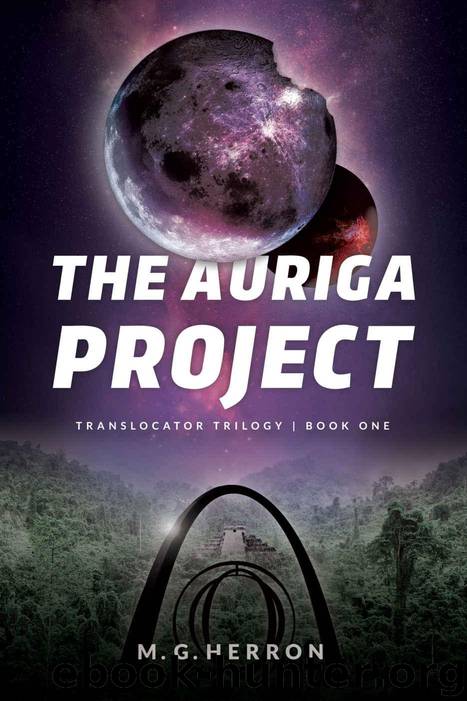The Auriga Project (Translocator Trilogy Book 1) by Herron M. G

Author:Herron, M. G. [Herron, M. G.]
Language: eng
Format: azw3
Published: 2015-09-14T16:00:00+00:00
11
Uchben Na
They filled the dead boy’s mouth with ground maize and a jade bead and buried him in a small mound behind the family home. Into the grave they reverently placed wooden effigies, a rubber ball, a fishing line. Over it they lit incense and said prayers. Dambu decapitated another bird.
Ixchel’s heart-rending public displays of grief lasted for several weeks following the funeral. She painted black stripes on her body and limbs with an ink made from crushed insects and flowers. She fasted, drinking only water and tea for sustenance, and grew thin. Sobs bubbled from her domicile each evening long into the night. Shortly before sunrise, a prolonged wail carried across the village. When she emerged from her pole and thatch hut, she sobbed quietly, discreetly, over the boy’s grave and on her aimless, shambling walks through the village.
Rakulo spent a lot of his time with her. His grief was distinctly less vocal, yet his presence seemed to do nothing to ease his mother’s pain.
As for Dambu, Eliana only saw his back as he stalked off into the jungle. Citlali said that was Dambu’s way of grieving. Eliana suspected that she, too, would give space to Ixchel in the throes of her grief.
Rakulo accompanied Dambu on long outings a few times. Once they were gone for three days. They always came back empty handed and with a grim look on their faces. They were not in the jungle hunting wild turkeys like other men who went in the same direction.
Eliana spent her days with Citlali. She was younger than Eliana by a decade, but wiser than her by a lifetime in terms of life in the village of Kakul. Eliana quizzed her relentlessly, absorbing knowledge like a cracked desert floor does water.
She learned the word for every plant and object she could find, repeating them to Citlali over and over and over again. She had no paper to write on, and the only way to get comfortable with a language—she knew from her years taking Spanish in high school and German in college—was to use it. She hoarded words and phrases.
Some were familiar. Most of the natives smoked sic, tobacco, and the act of smoking was sicar, close enough to cigar to be an obvious loanword to English. When rain fell, it was referred to as a junrakan, which sounded an awful lot like hurricane. Whether this word referred to the storm or the God of Storms who sent it, Eliana was never quite certain. The natives seemed to use the ideas interchangeably. So the word for hurricane could be used in both contexts: “A junrakan is coming” and “Praise Junrakan! I don’t have to carry another pot of water all the way from the river to water the garden.”
The jungle was k’aax, with the soft shushing sound at the end; the beach, jaal. They referred to the world with the word kab, but to the dirt or the earth as lu’um. The sky they called ka’an.
“And what do
Download
This site does not store any files on its server. We only index and link to content provided by other sites. Please contact the content providers to delete copyright contents if any and email us, we'll remove relevant links or contents immediately.
Sita - Warrior of Mithila (Book 2 of the Ram Chandra Series) by Amish(54856)
The Crystal Crypt by Dick Philip K(36854)
Cat's cradle by Kurt Vonnegut(15330)
Always and Forever, Lara Jean by Jenny Han(14894)
Ready Player One by Cline Ernest(14636)
The Last by Hanna Jameson(10246)
Year One by Nora Roberts(9782)
Persepolis Rising by James S. A. Corey(9348)
The remains of the day by Kazuo Ishiguro(8969)
Never let me go by Kazuo Ishiguro(8876)
Red Rising by Pierce Brown(8757)
Dark Space: The Second Trilogy (Books 4-6) (Dark Space Trilogies Book 2) by Jasper T. Scott(8169)
The handmaid's tale by Margaret Atwood(7752)
The Circle by Dave Eggers(7104)
Frank Herbert's Dune Saga Collection: Books 1 - 6 by Frank Herbert(7054)
The Testaments by Margaret Atwood(6878)
Legacy by Ellery Kane(6649)
Pandemic (The Extinction Files Book 1) by A.G. Riddle(6528)
Six Wakes by Mur Lafferty(6238)
